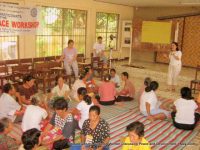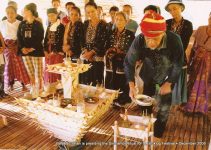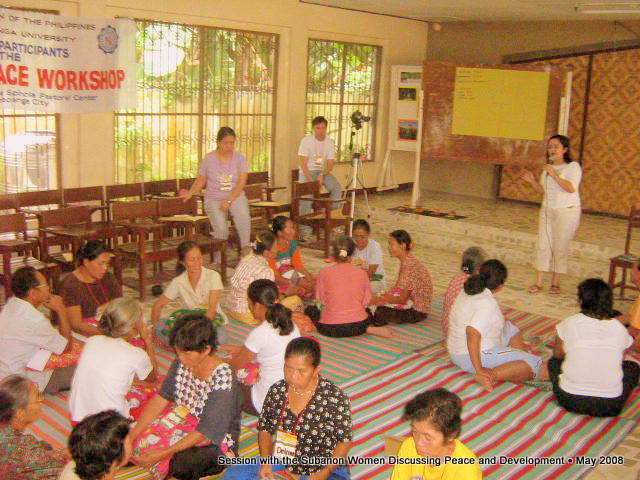(Written by Ms. Cecile B. Simbajon and Fr. Antonio F. Moreno SJ, This article initially appeared in The Windhover, 2010)
The Promotion of Peace
We have heard it said time and again that peace is elusive. Indeed it is not only elusive but can be perceived as divisive by others who have different notions of peace. The promotion of peace is a campaign to address very complex issues often connected with poverty, marginalization and cultural profiling. In several hotspots of Mindanao, conflict areas have deep historical roots spanning from the Spanish and American occupation down to the current marginalization of peoples by the national and local government. The deep ethnic cleavages within and among the settlers, indigenous and the Bangsamoro peoples, and experiences of political, economic and social exclusion, weak and in some cases absence of governance, the prevalence of local bossism and warlordism in several areas have all contributed to the complexity of the problem.
 Our work for peace is not simply oriented to promote and preserve tranquility, that is, the absence of war or armed conflict. In persistently conflict-laden societies in Mindanao, however, the mere absence of war can be a great success. Cessation of armed hostilities can save lives even when people continue to live in fear. Nonetheless, our understanding of peace goes beyond simply the cessation of conflict. Peace is comprehensive, development-oriented, culturally embedded and constructed by manifold sectors and communities within society.
Our work for peace is not simply oriented to promote and preserve tranquility, that is, the absence of war or armed conflict. In persistently conflict-laden societies in Mindanao, however, the mere absence of war can be a great success. Cessation of armed hostilities can save lives even when people continue to live in fear. Nonetheless, our understanding of peace goes beyond simply the cessation of conflict. Peace is comprehensive, development-oriented, culturally embedded and constructed by manifold sectors and communities within society.
In an effort to respond to the many challenges to promote peace and culture, in 1991, then Ateneo de Zamboanga (AdZ), under the leadership of Fr William H Kreutz SJ, established the Institute of Cultural Studies for Western Mindanao (ICSWM). This was AdZ’s way of assisting the people of Western Mindanao to work for peace in a multicultural and multireligious society. Peace promotion was geared toward cultural understanding and dialogue. ICSWM aimed to bring about harmonious and peaceful relationships by helping people overcome the ignorance, prejudices and animosities of the past through cultural regeneration and intercultural dialogue. We realized that the work of peace championed by ICSWM needed to be complemented with a task that focused on peace advocacy, peace education and interventions that address issues that breed violence and armed conflict. Thus the Ateneo Peace Institute (API) was created in 1999.
API initially assumed the following goals: 1) to coordinate, develop, implement and monitor peace education programs in all levels of instruction and formation in the curricular and co-curricular areas; 2) to link with and assist other schools, both private and public, in similar or related peace education and formation efforts; 3) to offer programs and activities related to developing a culture of peace in various government offices, non-government agencies, church and mosque communities, military and other non-school entities; 4) to engage in research activities related to the school’s peace activities beyond the school; 5) to develop persons to be peace advocates who will have the expertise to actively assist in conflict management and conflict resolution activities among those who seek such aid; and 5) to actively bring the Ateneo to linkages and network with other like-oriented organizations and groups.
Through the years, both ICSWM and API worked for peace in different streams, although many a time they would be working collaboratively. Both institutes would be tapped to instill a culture of peace on campus, generate activities and programs around peace education, network with other organized groups in the city and the region to address burning issues on peace and development, convene major stakeholders and attempt to forge consensus on matters concerning peace, security and the peace process.
In 2009, ICSWM and API were merged to form the Ateneo Peace and Culture Institute (APCI) to make it clear that the work of peace cannot be dissociated from culture. Under the engaging leadership of Ms Cecile B Simbajon, APCI has upscaled its operation and clarified its location in the task of peace building and conflict resolution. APCI was a key player in the integration of peace in our curriculum from Grade One to Fourth year college. This peace curriculum has been shared in different conferences for Catholic Schools in Mindanao and beyond. APCI’s main focus is the generation of a culture of peace on campus and beyond. To this end, a culture of peace survey is nearly completed to assess areas of success which we can celebrate and shortcomings which we can embrace and learn from.
APCI convened numerous fora and roundtable discussion sessions among key leaders of Zamboanga City to discuss a wide range of issues including the contentious Memo of Agreement on Ancestral Domain between the government and the Moro Islamic Liberation Front (MILF), kidnap-for-ransom (KFR) concerns, peace process in Mindanao, and the armed conflict in Basilan and Sulu. APCI has been our lead group for fostering a consciousness of peace (e.g., Week of Peace, interfaith assemblies for peace). Local and national peace groups and movements, the local church, local government units, business groups and civil society organizations have made sought the assistance of APCI on peace and development issues. Many individuals, national and international agencies have likewise approached APCI for consultations and partnerships. APCI at one point hosted the Mindanao Emergency Response Network (MERN) for relief operations in our region.
Zamboanga City-based Interreligious Solidarity Movement for Peace gave a “Special Peace Citation” to APCI on 20 November 2009 “(f)or offering meaning time and generous services to the cause of harmony and solidarity among the different multicultural peoples in Zamboanga City and Mindanao; for its untiring support and outstanding advocacy for peace amidst the conflicts and violence in the region.” The Philippine Star in its 20 December 2009 front page issue featured APCI along with the Center for Peace and Development of the Western Mindanao State Universities as “centers (that) help heal Mindanao.” These citations do not simply appear to APCI as “recognitions” but more as challenges to translate its commitment to work for peace into real substantive actions that have profound impact on our society.
We are all eternal beginners in the work of peace. Peace is elusive, but this doesn’t give us an excuse to disengage, but a challenge to pursue. This is our experience here in Western Mindanao: wage peace and hope will follow.

